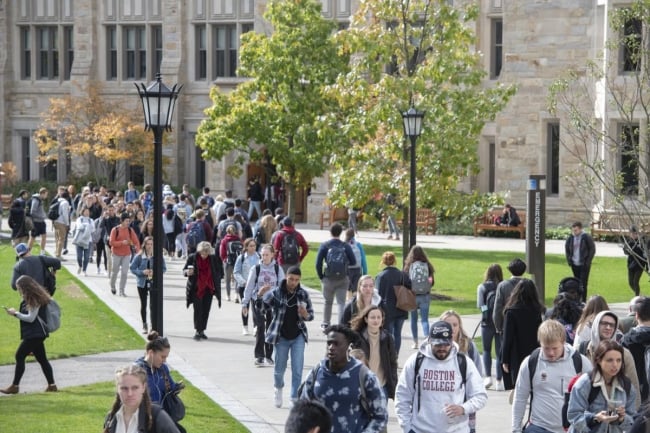You have /5 articles left.
Sign up for a free account or log in.

Boston College
Lee Pellegrini
Boston College, a private Jesuit institution, will open a new, two-year residential college on the former campus of Pine Manor College focused on serving underrepresented and first-generation students, according to an announcement by campus leaders today.
The plans are part of a larger initiative to enhance educational opportunity for underrepresented, first-generation students and is the result of the 2020 merger agreement between Boston College and Pine Manor, a small nearby private liberal arts college that suffered financial hardships prior to and during the pandemic. The merger resulted in the creation of the Pine Manor Institute for Student Success, which will house the two-year college and operate a new middle and high school enrichment program, as well as Boston College’s existing support initiatives.
Boston College is committing at least $100 million to the new institute and its programs with the goal of recruiting, retaining and graduating underrepresented and underserved first-generation students, said Thomas O’Reilly, president of Pine Manor College, which will be formally integrated into Boston College at the end of this academic year.
“This is a way to move everything forward in a big way,” he added.
The new two-year institution will be called Messina College, named after the first Jesuit school founded in Sicily, Italy, in 1548, and is scheduled to open in 2024. Messina will enroll 100 students each year and house them in the dorms at Pine Manor. Boston College president William P. Leahy, S.J., said he hopes the Messina students will transfer to Boston College but that their options will be “wide-open.”
O’Reilly said student housing—a rarity among two-year institutions—is a critical feature of the new college.
Campus leaders recognize “the intimacy that a residential environment offers students, especially underresourced students, in terms of having the support that they deserve,” he said. “Being able to go residential creates a great separation that enables them to be able to get centered and focused, free from distractions, that helps them to build their confidence, helps give them the mindfulness that they need and want.”
Boston College will join a small but growing number of religious colleges and universities offering two-year degrees. For example, Yeshiva University, a Jewish institution located in New York, established a two-year program in 2016. Loyola University Chicago, also a Jesuit institution, founded Arrupe College in 2015.
Davis Jenkins, senior research scholar at the Community College Research Center at Teachers College of Columbia University, said he likes the idea of “universities, and especially prestige universities like Boston College, with strong traditions of teaching and liberal arts … offering lower-division coursework with a view of providing [students] access to bachelor’s degrees and credentials they can use in the workplace.”
However, liberal arts colleges offering two-year options need to “think very carefully” to ensure their associate degrees make students marketable to future employers or enable them to transfer to universities where they can major in a field of their choice, Jenkins said.
Steve Katsouros, S.J., founding dean of Arrupe College, praised the effort. He currently is president and CEO of the Come to Believe Network, which seeks to replicate the Arrupe model at other higher education institutions. His organization did not work with Boston College and Pine Manor, but he believes the new two-year college will be an asset to low-income students in Boston area.
The new initiative is filling a “huge need” by “providing a bridge for students with academic potential to complete their associate degree and then to go on to a four-year institution to pursue a bachelor’s degree,” he said.
Leahy said the programs and supports offered at the institute will be different from those offered elsewhere, however.
For example, the institute will also run a new free academic enrichment program, called the Academy, for eighth- through 12th-grade students, including low-income students and those who would be the first in their families to attend college.
The first 40 incoming eighth graders, nominated by principals, teachers, counselors and community leaders, will stay on the Boston College campus each summer and take courses in math, science and English starting in June. Students will get help preparing for standardized tests and the college application process. They will also take a course for college credit during the summer before their senior year in high school to expose them to the rigors of college. Success coaches—undergraduate and graduate student mentors at Boston College—will be available to them throughout their years in the program.
The institute will continue reaching out to students through their time in college and for two years after they graduate, providing a full 10 years of support.
Students will have someone “who knows the individuals, keeps in touch, calls up, checks on them, offers advice, is available for mentoring,” Leahy said. “We just want to be the bridge.”
Joy Moore, executive director of the Pine Manor Institute for Student Success, noted that young people’s needs hardly end at graduation. She said early-career workers, especially those from first-generation and low-income backgrounds, could use “tips” on everything from how to navigate office politics to how to ask for a promotion.
The goal is to not only help students persist through college but offer students “a strong start in their careers, as well,” she said.
Leahy said the Academy and Messina College will complement each other and allow Boston College to support students from middle school through college and beyond.
“We’re trying to see if there’s a way they can be prepared for a life that’s full of promise and opportunity,” he said.





